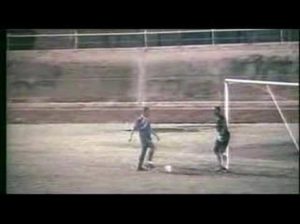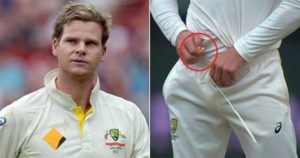What do Luis Suarez’ teeth, Nancy Kerrigan’s knees, Cameron Bancroft’s pockets, John Hopoate’s fingers, an Olympic Games Intellectually Disabled basketball competition and the Barbados national soccer team (oh… and lots and lots of other soccer teams and players) have in common? They all take center stage in some of the world’s nastiest and most hilarious sports cheating scandals. Titus O’Reily’s brand new book takes an inside look at the phenomenon of cheating in sport and lays the boot into the cheats while providing some answers as to why they carry out their despicable behaviours. Throughout the text he also reminds us that cheating usually has consequences and that the victims of cheating often suffer long term impacts that go further than merely the disappointment of being deprived of a victory. Socrates read O’Reily’s fascinating book in a small number of sittings. He found it difficult to put down. Here are his impressions. Read on!
Not surprisingly, Titus O’Reily kicks off his study of the dark arts of cheating in sport with a chapter on the circumstances or conditions that lead to acts of cheating. He explains that while money, gender, power, glory, and love of country can all play a part in a dodgy athlete’s decision to do the wrong thing, none of them are essential. Effectively, he argues, the only two elements required for cheating to take place are… a human being… and a competition that has a winner. Homo sapiens, as a species, love to win… no matter how trivial the reward… and many are willing to either bend or completely throw out the rule book in their effort to achieve a victory.

O’Reily sites the case of being invited around to a “friends” place for dinner only to be roped into a post-nosh Trivial Pursuit match. Somehow one of the blokes at the table manages to come up with the answer to the “Who was Ross Perot’s running mate in the 1992 US election” question. Despite the running mate’s own mother not remembering the answer to such an obscure question the host of the dinner party is all chuffed to be able to blurt out “Oh, I don’t know how I knew that. I must have read it somewhere recently. I’ll be damned. Was I really right?” O’Reily (and everyone else at the table) knew exactly where the smart-arse had read about the prospective US VP recently – he had read it while he was studying the question cards prior to the arrival of his guests. Like O’Reilly says, all you need is a human being and a game that recognizes a winner, and you have all the ingredients you need for possible dodgy behavior!
Difficult to put the book down
Throughout the next thirteen chapters Titus O’Reily examines cheating from every angle. Cheating done by individuals. Cheating done by teams. Cheating even done by entire nations and their Governments. He examines little acts of almost cheating (but not quite), bigger acts that are obviously cheating and atrocious acts that are so flagrant that it is unbelievable that anyone would try them. Opportunism. Bullying and intimidation. Doping. Equipment fiddling. Morality. All come under O’Reily’s microscope. Some of the scenarios described are incredibly stupid. Others are ingenious. Many are extraordinarily creative. Some are even life-threateningly dangerous! Most are hilariously funny. This book is jam-packed with dozens of examples of cheating from a wide range of sports that will keep sports enthusiasts up reading into the wee hours of the morning. Once you pick it up and start to discover some of the horrendous and absurd things many of your fellow hominids have done to win at sport you will find it very difficult to put the book down – even if you have to go to soccer practice.

One thing I will say for O’Reily, he is not afraid of a bit of research. I’ve gotta ask, Titus, where did you get all this stuff from? While many of the stories are famous events (the Tonya Harding versus Nancy Kerrigan skating shenanigans and the excruciating Seoul Olympics 100 m final where Ben Johnson kicked Carl Lewis’ arse only to have his own arse booted out of the race when he tested positive for steroids after the race) dozens of O’Reily’s tales are as obscure as hell yet he covers them all with exquisite and entertaining detail. How he discovered most of this stuff is a mystery to me.
I do like O’Reily’s writing style. Short punchy sentences… short punchy paragraphs… executed with a determination to take the piss out of individuals and groups who deserve to be lampooned mercilessly. Footnotes are normally used by authors to highlight a technical piece of supporting material that does not fit well into the text. O’Reily has a different approach. He often uses footnotes to wise-crack a little further on the content provide above. Do not miss the footnotes. Some of the best content in the book is at the bottom of each page. I particularly liked this little gem.
“I’ve used the term ‘soccer’ throughout this book just because it’s easier, as ‘football’ means different things in different countries. I know this will annoy soccer fans, but I’ve learned it’s impossible not to annoy soccer fans, so I haven’t worried about it. I’d also like to quickly add that I do love soccer, it’s a beautiful sport, please don’t hurt me.”
I liked this quote so much that I posted it on twitter. Big mistake. All it did was re-ignite the tiresome argument about what the sport should be named. I should have known better. The twitterati seemed oblivious to the point that the “football family” in their insistence on taking everything about their game so seriously was the actual butt of the joke.
Some examples of cheating provide by O’Reily that particularly took my fancy are provided below… but not too many. Go get and read the book yourself. I don’t want this little review to be a series of spoilers.
Sydney 2000 Paralympics – Intellectually disabled basketball championship
Who would cheat disabled athletes out of the opportunity to win a medal at an Olympic Games meet? The Spanish Intellectually disabled basketball team apparently, according to O’Reily. Problem was, they weren’t intellectually disabled. Given that missing limbs is much harder to fake than an intellectual disability you’d think that the OIC would have had a stringent vetting process for the vetting of athletes. Nup. The IOC kicked the responsibility for vetting back to the participating countries and it just so happened that the Spanish chief, Fernando Martin Vicente, was willing to pull all kinds of tricks to promote disabled sports in his own country including fake a disabled Spanish team to ensure the winning of a gold medal. His team of semi-pro players won the gold easily but unknown to Vicente, one of his players was an undercover journo up for a sting. Despite a sad attempt to cover up the pathetic saga the eventual newspaper story brought the scam undone and Vincente and his dodgy team found themselves in hot water.
Sadly, the innocent intellectually disabled athletes who committed no crime at the event were the ones that received the greatest punishment for the fraud when intellectually disabled competitions were excluded from Paralympics tournaments for many years to follow. As O’Reilly argues, throughout the book, the consequences for the victims of cheating scams often goes much further than the obvious loss of opportunities to win competitions.
Tanking
O’Reily provides some brilliant examples of where athletes “tanked” (deliberately tried to lose matches or give away points) to enhance their chances later in a tournament.

While Gary Lawson, the Dennis Rodman of lawn bowls, leading his New Zealand fours team to a loss against Thailand to avoid having to meet Australia later in a competition was entertaining enough, what some teams got up to in the 2012 Olympic Badminton tournament made the bowlers dressed in black look like tanking amateurs. We’re talking about both teams in a match trying to lose at the same time!
Over to Titus.
“Two teams playing early in the day – the Chinese team of Yu Yang and Wang Xiaoli and their South Korean opponents Jung Kyung-eun and Kim Ha-na – both worked out that it would be better if they lost. Each of them would still advance to the next round, but they would avoid another Chinese pairing who were ranked second in the tournament. In a sold-out Wembley Arena, in front of 6000 fans, these two top-ranked badminton pairings both attempted to lose the game. It was gloriously farcical. What should have been an elite match turned into something resembling a group of people trying out badminton for the first time, on the beach, for a laugh. While drunk.”
If you think that that’s funny wait until you hear about 1994 Caribbean Football Cup match between Barbados and Granada. It’s a killer. It’s most likely the stupidest soccer game ever played!
Prior to the tournament the organizers, with the best of intentions, decided that soccer draws should be a thing of the past and matches would be spiced up if they had extra time with a golden goal rule for drawn games. Additionally they decided that extra time golden goals should be worth two goals instead of one. This golden goal extra point could be really handy if goal difference were a thing at the end of the group stages of the tournament. It turned out to be a dumb idea. Here’s why.
Granada and Barbados were playing in their final group stage match and the minutes were winding down!
“Due to the standings in the group, Barbados had to beat Grenada by two goals to make it through to the knockout stages. Winning by one goal would not be enough, due to their goal difference, and Grenada would go through instead. Simple enough. The home crowd was therefore pretty excited when Barbados took a 2–0 lead during the game, and with the end of the match nearing, everything seemed to be working out well. Until, with just seven minutes left, Grenada scored, making it 2–1. The situation exploded. Not literally, but mathematically. Despite the fact Barbados were still leading, they needed to win by two goals. It looked like they were going out. Unless they scored a goal – any goal. Because of the new rule, if the score were tied at the end of regular time, it would go to extra time and Barbados could then score a golden goal that would count as two, taking them through. If they couldn’t score themselves, conceding a goal – or scoring an own goal – was suddenly a great outcome for the Barbadians. It led to a frenzied few minutes where Barbados tried to score at both ends of the pitch. You had Barbados attacking both goals and Grenada desperately defending both. It was certainly one of the strangest moments in sport, except it was about to get stranger. Barbados finally managed to score – an own goal, but it helped. The scores were now tied, and the match would be going to extra time in three more minutes, where a golden goal would see Barbados through. Unless, in the remaining three minutes of regular time, Grenada scored. At either end. Even a 3–2 loss would see Grenada go through on goal difference. So now you had Grenada attacking both goals and Barbados.”
Biting… and even worse!

Luis Suarez may well be one of the greatest soccer players to come out of Uruguay, but he had a reputation for using his formidable collection of teeth almost as much as he would use his talented feet. O’Reily describes how journalist, Ian Stedman, writing for the New Statesman, did some juggling of figures based on how many games Suarez had played, how many opponents had played against him and how many times he had bitten people and claimed that if you were unlucky enough to have to play against Luis you had around a one in two thousand chance of being bitten by him.
“To put those odds in perspective, you have a one-in-3.7 million chance of being bitten by a shark while swimming in the ocean and a one-in-ten-thousand chance of being struck by lightning. In other words, professional soccer players have a significantly greater chance of being bitten by Suárez than by a shark.”
Suarez got so famous for his chewing on people that before the 2014 World Cup one betting agency offered the odds of 175-1 that Luis would bite someone during the tournament. Only 167 took up the bet but Suarez didn’t let them down. They won a lot of money when he nibbled on Italian defender Chiellini’s shoulder.
Some would argue that Manly Warringah Rugby League player, John Hopoate, was even more disgraceful when it came to cheating. O’Reilly couldn’t let the chapter on morally reprehensible behaviour pass without giving special mention to the Sea Eagles player’s nasty habit of inserting a finger into his opponents arses. Hopoate always protested his innocence by claiming that he had only ever intended to give opposition players a wedgie. One of his victims, a bloke called Peter Jones begged to differ. ‘It wasn’t a wedgie. That’s when your pants are pulled up your arse. I think I know the difference between a wedgie and someone sticking their finger up my bum,’ he said. Fair point.
Ball tampering
Titus O’Reily’s conjectures verge on the sociological when he discusses the worst example of a group of Australians caught out cheating on the world stage! In a chapter on ball tampering he discusses the Australian cricketers using sandpaper to change the condition of the match ball in South Africa as an example of Australian belief in our own exceptionalism. He describes how “ball tampering” was not that unheard of in cricket and within the culture of the sport itself it was not considered a career-ending crime. It was seen more as a tap across the knuckles, cop a fine (and skip a few games) transgression. The Australian culture didn’t see it that way. Why, asks O’Reily? The answer that he gives is interesting and it makes a lot of sense.
“This obsession with sport and the importance it holds in Australia’s culture also comes with a firm belief that Australians don’t cheat at sport. Cheating would undermine the belief that Australia’s sporting success is a result of superior ability and hard work, that the country’s success was somehow a myth, based on fraudulent foundations. When others are caught cheating, it only further entrenches in Australian minds the exceptionalism of the Australian athlete who does not need to resort to such shortcuts to win. That’s why when Bancroft was filmed cheating, so clearly trying to sandpaper the ball, Australians were shocked. That image contradicted the view the country had of itself. It seemed to suggest that perhaps Australia was not exceptional; that it was like all the other countries who’ve cheated at cricket, as the English, Indians, Pakistanis and South Africans all have.”

Has there ever been an Aussie athlete who has not been innocent when it came to cheating? Over the years there have been a number of Australians who have fallen foul of dope tests but the athletes themselves, their coaches and fans, their fellow team members and Australian sports journalists have often claimed them to be “innocent victims” of some kind of international plot. Incredible how many Australians fall foul of the old “it must have been a dodgy substance in the supplement I was taking” trap. Chinese, Russian, East German (or any other nationality for that matter) that has the slightest hint of shoulders that are just a teensy bit too large are considered as guilty as hell. Well, many of them were, of course but it is the automatic assumption of guilt made by Australians that demonstrates our belief in our own exceptionalism.
The ball tampering in South Africa case was just too black and white a scenario for Australians to rationalize ourselves out of the guilty verdict. Bancroft, Smith, and the other bloke proved that Australians do cheat. The shit hit the fan. We are not quite the exceptional sporting super stars that we think we are. We do sometimes resort to cheating.
Lots more
There are dozens of other sports, stories, and characters described in the book including a close examination of the Tour de France, Lance Armstrong (where he got his name from and the presidential hopeful he dated), the Olympic Games, ice hockey, diving (simulation) and state sanctioned and enabled cheating. The analysis of East Germany’s State Plan 14.25 and the damage it did to it’s own unsuspecting young athletes is chilling.
In his winding up of the section on how even entire nations can do the unthinkable in the pursuit of national glory Titus O’Reily describes the treatment of Russian discus thrower Darya Pischalnikova. The silver medalist, in an act of good faith, tried to dob herself into WADA (World Anti-Doping Agency) for drug cheating after the London Olympics. She wanted them to investigate what was going on in the world of Russian drug detection and was trying to co-operate with WADA.
According to O’Reily, “WADA did what most of us do when we get an email that contains a problem that will take heaps of work to fix: they forwarded it to someone else. But in this case, they sent it to the Russian authorities. Which was an odd thing to do. Usually, when someone offers to be a whistle-blower, you don’t pass the case on to the people they’re blowing the whistle on.”
Poor old Darya was thrown under the bus by the organization that should have protected her. The Russians rewarded her honesty with a ten-year ban and did no further investigation.
What happened to Pischalnikova places an exclamation mark on Titus O’Reily’s feelings about drug cheats and those who protect them. He doesn’t like them! If there is a single point that O’Reily tries to make in this book that crops up time and time again it is that we should remember the victims of the sports cheats.
“Never forget that while the cheater seems like the more interesting person, each cheat leaves in their wake victims who are infinitely more worthy of praise and who are far better people,” he says.
If you love sport, get the book. It’s professionally researched, beautifully written, hilarious, engaging and lands punches where they are needed.

Leave a Reply